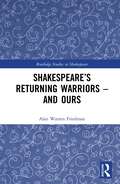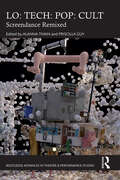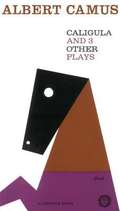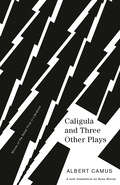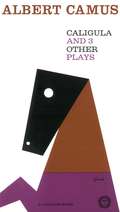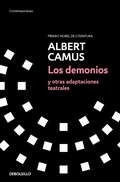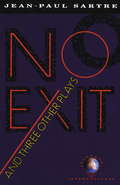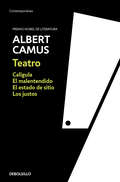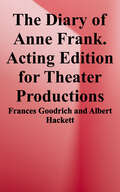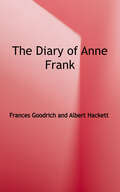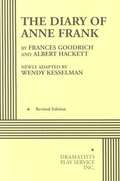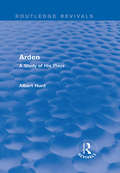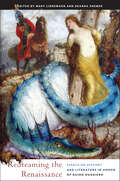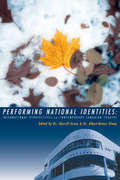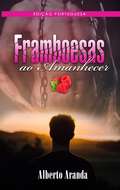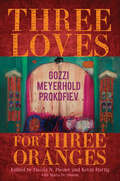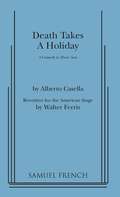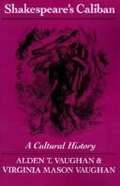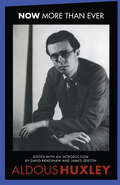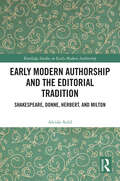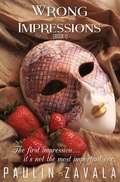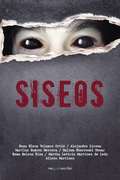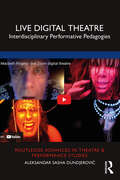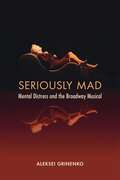- Table View
- List View
Shakespeare’s Returning Warriors – and Ours (Routledge Studies in Shakespeare)
by Alan Warren FriedmanShakespeare’s Returning Warriors – and Ours takes its primary inspiration from the contemporary U.S. Post-Traumatic Stress Disorder (PTSD) crisis in soldiers transitioning from battlefields back into society. It begins by examining how ancient societies sought to ease the return of soldiers in order to minimize PTSD, though the term did not become widely used until the early 1980s. It then considers a dozen or so Shakespearean plays that depict such transitions at the start, focusing on the tragic protagonists and antagonists in paradigmatic "returning warrior" plays, including Titus Andronicus, Julius Caesar, Othello, Macbeth, Antony and Cleopatra, and Coriolanus, and exploring the psychological and emotional ill-fits that prevent warrriors from returning to the status quo ante after battlefield triumphs, or even surviving the psychic demons and moral disequilibrium they unleash on their domestic settings and themselves. It also analyzes the history plays, several comedies, and Hamlet as plays that partly conform to and also significantly deviate from the basic paradigm. The final chapter discusses recent attempts to effect successful transitions, often using Shakespeare’s plays as therapy, and depictions of attempts to wage warfare without inducing PTSD. Through the investigation of the tragedies and model returning warrior experiences, Shakespeare’s Returning Warriors – and Ours highlights a central and understudied feature of Shakespeare’s plays and what they can teach us about PTSD today when it is a widespread phenomenon in American society.
LO: Screendance Remixed (ISSN)
by Alanna Thain Priscilla GuyThis edited collection assembles international perspectives from artists, academics, and curators in the field to bring the insights of screendance theory and practice back into conversations with critical methods, at the intersections of popular culture, low-tech media practices, dance, and movement studies, and the minoritarian perspectives of feminism, queer theory, critical race studies and more.This book represents new vectors in screendance studies, featuring contributions by both artists and theoreticians, some of the most established voices in the field as well as the next generation of emerging scholars, artists, and curators. It builds on the foundational cartographies of screendance studies that attempted to sketch out what was particular to this practice. Sampling and reworking established forms of inquiry, artistic practice and spectatorial habits, and suspending and reorienting gestures into minoritarian forms, these conversations consider the affordances of screendance for reimaging the relations of bodies, technologies, and media today.This collection will be of great interest to students and scholars in dance studies, performance studies, cinema and media studies, feminist studies, and cultural studies.
Caligula and Three Other Plays
by Albert Camus Stuart Gilbert'One word to tell the reader what he will not find in this book. Although I have the most passionate attachment for the theater, I have the misfortune of liking only one kind of play, whether comic or tragic.
Caligula and Three Other Plays (Vintage International Ser.)
by Albert CamusFour thought-provoking masterworks for the theater by the Nobel Prize–winning author of The Stranger and The Plague, in a restorative new translation by Ryan Bloom that brings together, for the first time in English, Camus's final versions of the plays, along with deleted scenes and alternate lines of dialogue. Though known for his novels that plumb the depths of absurdism, it was the theater stage that Camus called &“one of the only places in the world I'm happy." After forming two troupes in his early twenties in Algeria, the prolific author moved to Paris for work, where between 1944-1949 he would go on to stage the four original plays gathered in this collection.Caligula, his first full-length work for the stage, begins with the infamous Roman emperor in the throes of grief at the death of his sister Drusilla and tugs at the same essential question that haunts so much of Camus&’s work: Faced with the nullifying force of time, which snuffs out even our grandest emotions, how does one go on living? And is there a limit to the hardness of the human heart?Here too are The Misunderstanding, a murderous tangle of the longing for home and the longing for elsewhere; The Just, depicting the 1905 assassination of a Grand Duke in Moscow and testing the ethical limits of one&’s belief in a political cause; and State of Emergency, an allegorical romp where The Plague itself appears as a central character, shedding new light on our current battles with viral disease and authoritarian regimes.These are engaging, often incendiary works, now in fresh English translations that beg to be performed.
Caligula and Three Other Plays (Vintage International)
by Albert Camus'One word to tell the reader what he will not find in this book. Although I have the most passionate attachment for the theater, I have the misfortune of liking only one kind of play, whether comic or tragic.'
Los demonios y otras adaptaciones teatrales
by Albert CamusUn novedoso volumen con las seis obras que adaptó Albert Camus en su labor teatral, cuatro de ellas inéditas en castellano. Además de escribir cuatro obras originales, Albert Camus llevó a cabo una intensa labor como adaptador y director teatral. Ese trabajo poco conocido lo ocupó desde sus días de estudiante en Argelia hasta poco antes de su muerte, y las seis obras reunidas en este volumen dan testimonio de la pasión con que lo llevó a cabo. Una de ellas procede de un clásico francés del siglo XVI, dos son versiones de obras de Calderón y Lope de Vega, una cuarta retoma una pieza de Dino Buzzati y las dos restantes llevan a escena novelas de Faulkner y Dostoievski. El conjunto no solo ofrece un complemento perfecto de las obras del autor que hemos reunido con el título de Teatro, sino que muestra toda su versatilidad en el ámbito amplio de la escena, uno de los pocos lugares del mundo donde, en sus palabras, era feliz. «El teatro me ofrece la comunidad que necesito -escribió-. Aquí todos estamos vinculados sin que nadie deje de ser libre: ¿no es una buena fórmula para la sociedad futura?».
No Exit and Three Other Plays
by Albert Camus Jean-Paul Sartre4 plays about an existential portrayal of Hell, the reworking of the Electra-Orestes story, the conflict of a young intellectual torn between theory and conflict and an arresting attack on American racism.
Teatro
by Albert CamusLa cuatro grandes obras de teatro originales de Albert Camus reunidas en un solo volumen, con un prólogo inédito del autor El presente volumen reúne las cuatro obras de teatro originales de Albert Camus: El malentendido (1944), Calígula (1945), El estado de sitio (1948) y Los justos (1949). Todas pertenecen a lo que podría llamarse el teatro moral o de ideas, relacionado formal y temáticamente con la tragedia clásica, a la que el autor era muy afecto. Sus temas y ambientes abarcan desde el sino trágico de una familia en plena Segunda Guerra Mundial hasta los ataques terroristas de un grupo de revolucionarios rusos, pasando por un brote de peste en una Cádiz imaginaria, o una recreación histórica de los excesos del tirano romano Calígula. Pero Camus sabía que al reflejar momentos históricos todo artista acaba hablando del presente. Así pues, en estas obras escritas a caballo de la Segunda Guerra Mundial encontramos sus preocupaciones habituales sobre el absurdo, la rebeldía, la sociedad y el individuo modernos. El autor ha dicho:«¿Por qué hago teatro? Pues bien, a menudo me lo he preguntado. Y la única respuesta que he podido dar hasta ahora parecerá de una trivilidad descorazonadora: simplemente porque el escenario de un teatro es uno de los lugares del mundo donde soy feliz. El teatro me ofrece la comunidad que necesito [...] Aquí todos estamos vinculados los unos a los otros sin que nadie deje de ser libre o casi: ¿no es una buena fórmula para la sociedad futura?»
The Diary of Anne Frank
by Frances Goodrich Albert HackettA two-act play based on the diary of a Jewish girl who died in a Nazi concentration camp at the age of fifteen.
The Diary of Anne Frank
by Frances Goodrich Albert HackettThe Diary of Anne Frank by Frances Goodrich and Albert Hackett "This Drama Play is a wonderful addition to anyone who has a passion for Anne Frank related reading. A dramatization for the stage and ready for anyone, including schools, to use."
The Diary of Anne Frank (Acting Edition for Theater Productions)
by Albert Hackett Wendy Ann KesselmanA two-act play based on the diary of a Jewish girl who died in a Nazi concentration camp at the age of fifteen.
Arden: A Study of His Plays (Routledge Revivals)
by Albert HuntJohn Arden was one of the major playwrights to have emerged during the 1950s, yet his work has arguably been misunderstood. In this book, first published in 1974, Albert Hunt’s primary concern is to relate the plays written by John Arden alone, as well as those written in collaboration with Margaretta D’Arcy, both to Arden’s whole concept of theatre, and to his social and political attitudes. The book begins with a biographical introduction, followed by a play-by-play study of Arden’s work and a survey of the impact of his plays in performance, alongside fascinating images. Celebrating the work and life of the playwright, this timely reissue will be of particular value to students of theatre studies as well as professional actors with an interest in John Arden’s plays and theatrical ideologies.
Redreaming the Renaissance: Essays on History and Literature in Honor of Guido Ruggiero (The Early Modern Exchange)
by Albert Russell Ascoli Paula Findlen Joanne M. Ferraro Nicholas Terpstra Suzanne Magnanini Konrad Eisenbichler Courtney Quaintance Meredith K. Ray Alessandro Arcangeli Massimo Rospocher Julia L. Hairston Douglas G. BiowRedreaming the Renaissance seeks to remedy the dearth of conversations between scholars of history and literary studies by building on the pathbreaking work of Guido Ruggiero to explore the cross-fertilization between these two disciplines, using the textual world of the Italian Renaissance as proving ground. In this volume, these disciplines blur, as they did for early moderns, who did not always distinguish between the historical and literary significance of the texts they read and produced. Literature here is broadly conceived to include not only belles lettres, but also other forms of artful writing that flourished in the period, including philosophical writings on dreams and prophecy; life-writing; religious debates; menu descriptions and other food writing; diaries, news reports, ballads, and protest songs; and scientific discussions. The twelve essays in this collection examine the role that the volume’s dedicatee has played in bringing the disciplines of history and literary studies into provocative conversation, as well as the methodology needed to sustain and enrich this conversation.
Performing National Identities
by Sherrill Grace Albert-Reiner GlaapA collection of eighteen original essays on contemporary Canadian theatre by scholars and drama specialists in Canada, Great Britain, Europe, Australia, Hungary, and Japan. The international scope of the volume, reflected in its co-editors (Sherrill Grace from Canada, Albert-Reiner Glaap from Germany), confirms the new importance of Canadian plays on the world stage.
Frambuesas ao Amanhecer
by Alberto Aranda de la GalaA história eo caminho de um jovem que, depois de un eventual happenour na sua vida - a morte do seu melhor amigo - decide sair da aldeia onde vive y viaja para una gran cita en busca de la fama y hace exito ... custe o que custar. Recriada nos anos 90, em Espanha.
Three Loves for Three Oranges: Gozzi, Meyerhold, Prokofiev (Russian Music Studies)
by Caryl Emerson Laurence Senelick Domenico Pietropaolo Natalya Baldyga Inna Naroditskaya Simon A. Morrison Alberto Beniscelli Giulietta Bazoli Ted Emery Raissa Raskina Vadim Shcherbakov Julia Galanina Natalia Savkina John E. BowltIn 1921, Sergei Prokofiev's Love for Three Oranges—one of the earliest, most famous examples of modernist opera—premiered in Chicago. Prokofiev's source was a 1913 theatrical divertissement by Vsevolod Meyerhold, who, in turn, took inspiration from Carlo Gozzi's 1761 commedia dell'arte–infused theatrical fairy tale. Only by examining these whimsical, provocative works together can we understand the full significance of their intertwined lineage. With contributions from 17 distinguished scholars in theater, art history, Italian, Slavic studies, and musicology, Three Loves for Three Oranges: Gozzi, Meyerhold, Prokofiev illuminates the historical development of Modernism in the arts, the ways in which commedia dell'arte's self-referential and improvisatory elements have inspired theater and music innovations, and how polemical playfulness informs creation. A resource for scholars and theater lovers alike, this collection of essays, paired with new translations of Love for Three Oranges, charts the transformations and transpositions that this fantastical tale underwent to provoke theatrical revolutions that still reverberate today.
Death Takes a Holiday
by Alberto CassellaDrama / Casting: 7m, 6f / Scenery: Interior Produced with great success on Broadway, this striking drama has established itself among the important plays of our time. It is based on the poetic conception of death suspending all activities for three days during which he falls in love with a beautiful girl and through her realizes why mortals fear him. The mood of the play is established with remarkable skill and while it is charged with exciting moments, it is a perfect background for a love story that is as simple as it is appealing. The character who symbolizes Death is a very human person, with no conventional claptrap dragged in for mere effect. Here is a play that stimulates discussion and presents a novel and optimistic philosophy of the problems of love and death. This is one of the most popular and successful plays for amateurs.
Shakespeare's Caliban: A Cultural History
by Alden T. Vaughan; Virginia Mason VaughanShakespeare's Caliban examines The Tempest's "savage and deformed slave" as a fascinating but ambiguous literary creation with a remarkably diverse history. The authors, one a historian and the other a Shakespearean, explore the cultural background of Caliban's creation in 1611 and his disparate metamorphoses to the present time.
Now More Than Ever: An Edition
by Aldous HuxleyOver the course of his career, British writer Aldous Huxley (1894-1963) shifted away from elitist social satires and an atheistic outlook toward greater concern for the masses and the use of religious terms and imagery. This change in Huxley's thinking underlies the previously unpublished play Now More Than Ever. Written in 1932-1933 just after Brave New World, Now More Than Ever is a response to the social, economic, and political upheavals of its time. Huxley's protagonist is an idealistic financier whose grandiose schemes for controlling the means of production drive him to swindling and finally to suicide. His fate allows Huxley to expose the evils he perceives in free-market capitalism while pleading the case for national economic planning and the rationalization of Britain's industrial base. This volume contains the full text of Now More Than Ever, which was believed to be lost until 1976, when a copy was found at the Harry Ransom Humanities Research Center of the University of Texas at Austin. A "thinker's play" that has never been produced on stage, it is the last previously unpublished piece of Huxley's major writings and immensely important to understanding his development as a writer. The editors of this volume have annotated the play for contemporary readers. Their introduction sets the play in the context of Huxley's intellectual life.
La Casa de Playa
by Alec Silva Denia McGrewDos amigos van a pasar unos días en una casa de playa. Pronto descubren que sólo uno puede entrar en la casa, mientras que el otro, impedido por una fuerza invisible, está obligado a dormir en la terraza. Mientras intentan entender el misterio del lugar, las interrogantes y las incertidumbres mostrarán que la respuesta a la pregunta principal es más simple de lo que imaginan.
Early Modern Authorship and the Editorial Tradition: Shakespeare, Donne, Herbert, and Milton (Routledge Studies in Early Modern Authorship)
by Aleida AuldThis volume adds a new dimension to authorship studies by linking the editorial tradition to the transformative reception of early modern authors and their works across time. Aleida Auld argues that the editorial tradition provides privileged access to the reception of early modern literature, informing our understanding of certain reconfigurations and sometimes helping to produce them between their time and our own. At stake are reconfigurations of oeuvre and authorship, the relationship between the author and work, the relationship between authors, and the author’s own role in establishing an editorial tradition. Ultimately, this study recognizes that the editorial tradition is a stabilizing force while asserting that it may also be a source of strange and provocative reconceptions of early modern authors and their works in the present day. Scholars and students of early modern literature will benefit from this approach to editing as a form of reception that encompasses all the editorial decisions that are necessary to ‘put forth’ a text.
Wrong Impressions [Book I]
by Paulin Zavala Alejandra Mendoza ZacaríasHow much can it affect to want to meet someone? Idealization to a person is powerful and unpredictable. Will he be able to fulfill the expectations, which for years has been created on the girl? Allan Estrada is a man who had just lost his parents, he thought he would never be able to trust anyone, he had been in charge of a millionaire company and he had no idea how to handle it. His luck changed when he met Antonio, who supported him and helped him out of the shadows, and when he began to tell him about his youngest daughter, he was interested in meeting the girl. Only she did not make it easy.
Siseos
by Rosa Elena Velasco Ortiz Alejandro Licona Halima Kherroubi NouarUna mirada particular a los «siseos» del alma; esos ruidos perturbadores que nos tambalean los huesos y nos erizan la piel. <P><P>Siseos es una antología formada por trece textos que llevan como tema central los «temores del alma», precisando una diferencia clara entre el terror, acción que se siente en el cuerpo; el miedo, una acción que perturba la psicología; y el temor, que tiene que ver con un acto del espíritu, es decir: el temor nace aparejado con el enfrentamiento ante uno mismo. <P><P>El terror de estos textos es una mirada particular a los «siseos» del alma; esos ruidos perturbadores que nos tambalean los huesos y nos erizan la piel. Los autores de Siseos somos un grupo de autores mexicanos enamorados del teatro y la dramaturgia: Alejandro Licona, autor de más de 100 obras, ganador de premios en México y el extranjero, guionista, novelista y maestro. Aileen Martínez es Doctora en Lingüística por el Colegio de México y escritora desde hace más de 15 años; ha ganado premios de teatro por sus obras El patético final del cuervo en su museo barroco y El Grillo. Mariluz Suárez Herrera, es traductora y escritora; ha impartido talleres y conferencias, forma parte del Seminario de Cultura Náhuatl en la UNAM y es miembro de la Unión Latinoamericana de Escritores. Halima Kherroubi Nouar es lingüista, profesora y escritora; ha publicado tanto narrativa como teatro. <P><P>Rosa Helena Ríos es escritora, guionista, dramaturga y actriz; ha dirigido y puesto en escena en diversos espacios teatrales y ha sido jurado en diversos concursos de teatro y cine. Martha Leticia Martínez de León es Hermeneuta en libros Sagrados, maestra en Ciencias Bíblicas y Hebreo Antiguo y licenciada en Ciencias Religiosas. Es conferencista a nivel nacional e internacional y catedrática. Y Rosa Elena Velasco Ortiz es periodista y escritora, ganadora de premios de guion de largometrajes y dramaturgia y asesora en Laboratorios de cine. Ha trabajado en prensa, radio, televisión y cine.
Live Digital Theatre: Interdisciplinary Performative Pedagogies (Routledge Advances in Theatre & Performance Studies)
by Aleksandar Sasha DundjerovićLive Digital Theatre explores the experiences of Interdisciplinary Performing Arts practitioners working on digital performance and in particular live digital theatre. Collaborating with world-leading practitioners – Kolectiv Theatre (UK), Teatro Os Satyros (Brazil), and The Red Curtain International (India)- this study investigates the ways to bring live digital performance into theatre training and performance making. The idea of Interdisciplinary Performative Pedagogies is placed within the context of the exploration of live digital theatre and is used to understand creative practices and how one can learn from these practices. The book presents a pedagogical approach to contemporary practices in digital performance; from interdisciplinary live performance using digital technology, to live Zoom theatre, YouTube, mixed media recorded and live performance. The book also combines a series of case studies and pedagogical practices on live digital performance and intermedial theatre. This book will be of great interest to students and scholars in performing arts, digital arts, media, and gaming.
Seriously Mad: Mental Distress and the Broadway Musical
by Aleksei GrinenkoTheatermakers in the United States have long been drawn to madness as a source of dramatic spectacle. During the Broadway musical’s golden age in the mid-twentieth century, creative teams used the currently in-vogue psychoanalytic ideas about mental life to construct troubled characters at odds with themselves and their worlds. As the clinical and cultural profile of madness transformed over the twentieth century, musicals continued to delve into the experience of those living with mental pain, trauma, and unhappiness. Seriously Mad offers a dynamic account of stage musicals’ engagement with historically significant theories about mental distress, illness, disability, and human variance in the United States. By exploring who is considered mad and what constitutes madness at different moments in U.S. history, Aleksei Grinenko shows how, in attempts to bring the musicals closer to highbrow sophistication, theater dramatized serious medical conditions and social problems. Among the many Broadway productions discussed are Next to Normal, A Strange Loop, Sweeney Todd, Man of La Mancha, Gypsy, Oklahoma!, and Lady in the Dark.
